
PROCESAMIENTO DEL LENGUAJE NATURAL
Scope & Guideline
Innovating the Future of Linguistic Research
Introduction
Aims and Scopes
- Natural Language Processing Methodologies:
The journal encompasses a wide range of NLP methodologies, including machine learning, deep learning, and rule-based approaches, focusing on their application to language analysis, understanding, and generation. - Multilingual and Cross-Linguistic Studies:
It emphasizes multilingual and cross-linguistic research, particularly studies involving Spanish, Basque, Catalan, and other languages, addressing challenges in language processing and translation. - Real-World Applications:
Research published in the journal often highlights practical applications of NLP in various domains, such as healthcare, media, and education, showcasing the real-world impact of language processing technologies. - Social and Ethical Implications:
The journal also addresses the social and ethical implications of NLP technologies, including studies on hate speech detection, toxicity in online comments, and the impact of AI on language and communication. - Corpus Development and Annotation:
A significant focus is placed on the development of annotated corpora and resources that support various NLP tasks, contributing to the advancement of language technology.
Trending and Emerging
- Transformer-Based Models and Deep Learning:
There is a surge in research utilizing transformer-based models and deep learning techniques for various NLP tasks, such as translation, classification, and sentiment analysis, showcasing the advancements and effectiveness of these methodologies. - Hate Speech and Toxicity Detection:
The detection and analysis of hate speech and toxic comments have become prominent themes, reflecting societal concerns and the need for responsible language technologies in online environments. - Ethical Considerations in NLP:
Emerging discussions around the ethical implications of NLP technologies, such as bias detection, data privacy, and the societal impact of AI, indicate a growing awareness and responsibility within the research community. - Clinical Text Processing:
Research focusing on the processing of clinical texts, including tasks like medical report simplification and patient data analysis, is gaining traction, emphasizing the importance of NLP in healthcare. - Multilingual and Cross-Cultural Applications:
The trend toward multilingual NLP applications is increasing, with studies examining code-switching, dialectal variations, and the processing of low-resource languages, highlighting the importance of inclusivity in language technologies.
Declining or Waning
- Rule-Based Approaches in NLP:
There is a noticeable decline in the emphasis on traditional rule-based approaches to NLP, as the field increasingly shifts towards machine learning and deep learning techniques, particularly transformer-based models. - General Sentiment Analysis:
The focus on generic sentiment analysis tasks has waned, with more specialized applications emerging, such as sentiment analysis in specific domains like healthcare or tourism. - Basic Language Generation Tasks:
Basic tasks in language generation, such as simple text summarization or basic translation, are becoming less frequent in favor of more complex and context-aware generation tasks, reflecting a shift towards higher-level applications. - Local Context Analysis:
Research that focuses on local or micro-level linguistic phenomena (e.g., individual word analysis) is decreasing, as there is a growing interest in broader discourse analysis and understanding contextual relationships in larger text structures.
Similar Journals

Linguistics Vanguard
Connecting scholars through cutting-edge linguistic exploration.Linguistics Vanguard is a premier academic journal dedicated to advancing research in the field of linguistics and language studies, published by the esteemed Walter de Gruyter GmbH. With its impact factor placing it in the Q1 category for Linguistics and Language as of 2023, the journal demonstrates a significant influence in the academic community, boasting a Scopus rank of #194 out of 1088 in Arts and Humanities and a commendable percentile of 82. Since its inception in 2015, the journal has served as a critical platform for disseminating innovative research and fostering dialogue among scholars and practitioners, encapsulating a wide range of topics within linguistics. Despite being a subscription-based publication, it maintains an open approach to scholarship, encouraging robust academic exchange. Located in Berlin, Germany, at Genthiner Strasse 13, D-10785, Linguistics Vanguard is a must-read for those seeking to stay at the forefront of linguistic research and theory.
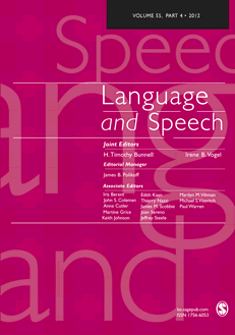
LANGUAGE AND SPEECH
Pioneering Research in the Heart of CommunicationLANGUAGE AND SPEECH, published by SAGE PUBLICATIONS LTD, is a premier journal that serves the multifaceted realms of linguistics, speech science, and sociology. With a robust history of scholarly contribution since 1958 and an anticipated continuation through to 2024, the journal is recognized for its high-impact research, boasting a commendable impact factor and achieving Q1 ranking in both Linguistics and Sociology as well as Q2 in Medicine and Speech and Hearing categories as of 2023. The journal, available in both print and online formats with ISSN 0023-8309 and E-ISSN 1756-6053, provides a vital platform for interdisciplinary discourse among researchers, professionals, and students alike. Its rigorous review process and quality publications place it at the forefront of academic inquiry, offering critical insights that advance the understanding of language and its implications in various contexts. As a key resource in the field, LANGUAGE AND SPEECH continues to foster innovation and knowledge dissemination, making it an essential addition to the libraries of those committed to exploring the depths of communication sciences.

ELIA-Estudios de Linguistica Inglesa Aplicada
Innovative Research in English Linguistics: Accessible to AllELIA-Estudios de Linguistica Inglesa Aplicada, published by the University of Sevilla, Faculty of Philology, is an esteemed open-access journal that has been a cornerstone in the field of English Linguistics since its establishment in 2000. With an ISSN of 1576-5059 and an E-ISSN of 2253-8283, ELIA aims to foster scholarly research and discourse by providing a platform for innovative studies in linguistics and applied language studies. As a testament to its academic rigor, the journal has achieved a Q2 ranking in Linguistics and Language for 2023, reflecting its impact and relevance within the academic community. The journal is indexed in Scopus, further solidifying its standing with ranks in both the Arts and Humanities and Social Sciences categories. Researchers, professionals, and students alike will find valuable insights and research findings that contribute to the evolving understanding of English linguistics. The journal is based in Sevilla, Spain, and can be accessed freely online, making it an accessible resource for those engaged in the study of language and linguistics.

Languages
Connecting scholars to the heartbeat of language research.Languages, published by MDPI, is a prestigious open-access journal dedicated to the field of Linguistics and Language studies. Since its inception in 2016, this journal has rapidly established itself as a leading platform for high-quality research, achieving an impressive Q1 ranking in 2023 and standing out in both the Arts and Humanities as well as the Social Sciences categories with significant percentile rankings (76th and 74th respectively). Based in Switzerland, Languages fosters an international community of scholars who are committed to exploring the multifaceted dimensions of language, from theoretical frameworks to practical applications. With a robust e-ISSN of 2226-471X, the journal prioritizes accessibility, allowing researchers, professionals, and students to freely engage with cutting-edge research and insights. By bridging the gap between theory and practice, Languages plays a crucial role in advancing our understanding of linguistic phenomena, making it an invaluable resource for anyone invested in the study of language.

AI, published by MDPI, is a distinguished open access journal dedicated to advancing the field of artificial intelligence. Since its inception in 2020, the journal has swiftly established itself as a prominent platform for scholarly research, currently ranking in the Q2 category for 2023 within the artificial intelligence sector according to Scopus. With an impressive global reach from its base in Basel, Switzerland, the journal aims to foster innovation and collaboration among researchers, professionals, and students alike, providing a forum to share groundbreaking findings and applications in AI. The journal's commitment to accessibility ensures that research is available to a wide audience, enhancing knowledge dissemination and contributing significantly to the ongoing evolution of artificial intelligence technologies. To explore the latest in AI research, readers can access articles through their open access model, encouraging an inclusive academic environment.
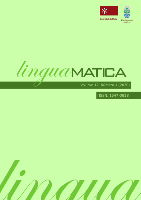
Linguamatica
Fostering Collaboration in Language Research Excellence.Linguamatica is a prominent open-access journal published by UNIV MINHO, INST EDUCACAO, CENTRO INVESTIGACAO EDUCACAO in Portugal, with the objective of advancing the field of linguistics and language studies. Since its establishment in 2009, the journal has served as a vital platform for disseminating high-quality research and innovative studies in linguistics, emphasizing both theoretical and applied perspectives. With an impressive Scopus ranking placing it in the 76th percentile in Arts and Humanities and the 73rd percentile in Social Sciences, Linguamatica is recognized for its significant contributions and rigorous peer-review process. The journal's commitment to open-access publishing ensures that research findings are accessible to a wider audience, fostering collaboration and knowledge sharing among researchers, professionals, and students. Located at CAMPUS GUALTAR, BRAGA 4710, PORTUGAL, Linguamatica aims to be a leading source of valuable insights in linguistics, covering a diverse array of topics from language acquisition to sociolinguistics, thereby playing a crucial role in shaping contemporary language research.
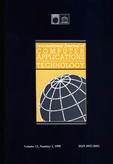
INTERNATIONAL JOURNAL OF COMPUTER APPLICATIONS IN TECHNOLOGY
Exploring the intersection of theory and application in computing.International Journal of Computer Applications in Technology is a reputable academic journal published by InderScience Enterprises Ltd, dedicated to advancing the field of computer applications across various domains including Computer Networks and Communications, Computer Science Applications, and more. With an ISSN of 0952-8091 and an E-ISSN of 1741-5047, this journal has been a credible source of research since its inception in 1976, transitioning into its current form in 1988. With its consistent rank in the Q3 quartile for several key engineering and computer science categories in 2023, it highlights the significance of the journal and its contributions to ongoing discourse in these fields. Researchers benefit from its wide-ranging scope, which encompasses both theoretical and practical applications of technology, making it an invaluable resource for both industry professionals and academic scholars. Although it currently does not provide open access, the journal remains committed to disseminating high-quality research that is essential for technological advancement and innovation.
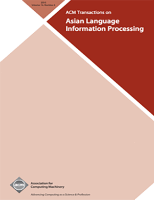
ACM Transactions on Asian and Low-Resource Language Information Processing
Innovating solutions for linguistic diversity in computing.ACM Transactions on Asian and Low-Resource Language Information Processing is a distinguished scholarly journal published by the Association for Computing Machinery (ACM), focusing on the processing of Asian and low-resource languages in the field of computer science. With an ISSN of 2375-4699 and an E-ISSN of 2375-4702, this journal serves as a vital platform for researchers and professionals dedicated to advancing language technology and natural language processing in underrepresented linguistic contexts. It has achieved a notable position in the academic community, ranking #94 out of 232 in the broader category of Computer Science with a 59th percentile ranking according to Scopus. As the journal converges on its comprehensive goals from 2015 to 2024, it emphasizes open debates and innovative methodologies to tackle challenges relevant to low-resource language processing. This commitment to publishing high-quality research, though it does not currently offer open access, ensures that the journal remains an essential resource for researchers, educators, and students striving to contribute to this dynamic field.
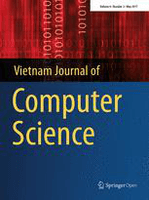
Vietnam Journal of Computer Science
Empowering researchers to shape the future of technology.Vietnam Journal of Computer Science, published by World Scientific Publishing Co Pte Ltd, serves as a prominent platform for researchers and professionals in the rapidly evolving field of computer science. Launched as an Open Access journal in 2013, it aims to disseminate high-quality research across various subfields, including Artificial Intelligence, Computational Theory and Mathematics, Computer Vision, and Information Systems. With its ISSN 2196-8888 and E-ISSN 2196-8896, the journal provides valuable insights and contributes to the growing body of knowledge in computer science, particularly in Southeast Asia. Despite its relatively recent establishment, the journal has achieved significant rankings, including Q3 status in multiple categories and notable visibility in Scopus metrics, evidencing its commitment to fostering innovative research. This journal is essential for those looking to stay at the forefront of computational advancements and applications, particularly in Vietnam and beyond, facilitating an engaging dialogue among scholars and industry professionals.

TRAITEMENT AUTOMATIQUE DES LANGUES
Transforming Linguistic Challenges into SolutionsTRAITEMENT AUTOMATIQUE DES LANGUES is a prominent academic journal dedicated to the field of automatic language processing, published by the ASSOCIATION TRADUCTION AUTOMATIQUE LINGUISTIQUE APPLIQUEE in France. Established as a crucial resource for researchers and practitioners, the journal explores innovative approaches to linguistics and language applications, contributing significantly to the understanding and advancement of technology in language processing. Although it currently holds a Q4 ranking across categories such as Computer Science Applications and Linguistics in the 2023 Scopus metrics, the journal encourages submissions that push the boundaries of current methodologies, seeking to elevate the discourse within these disciplines. With no open access policies specified, the journal serves as an exclusive platform for scholarly communication through traditional access means. TRAITEMENT AUTOMATIQUE DES LANGUES aims to foster collaboration and stimulate advancements in the richly interlinked areas of language technology, computation, and linguistics, making it an invaluable resource for students, researchers, and professionals alike.